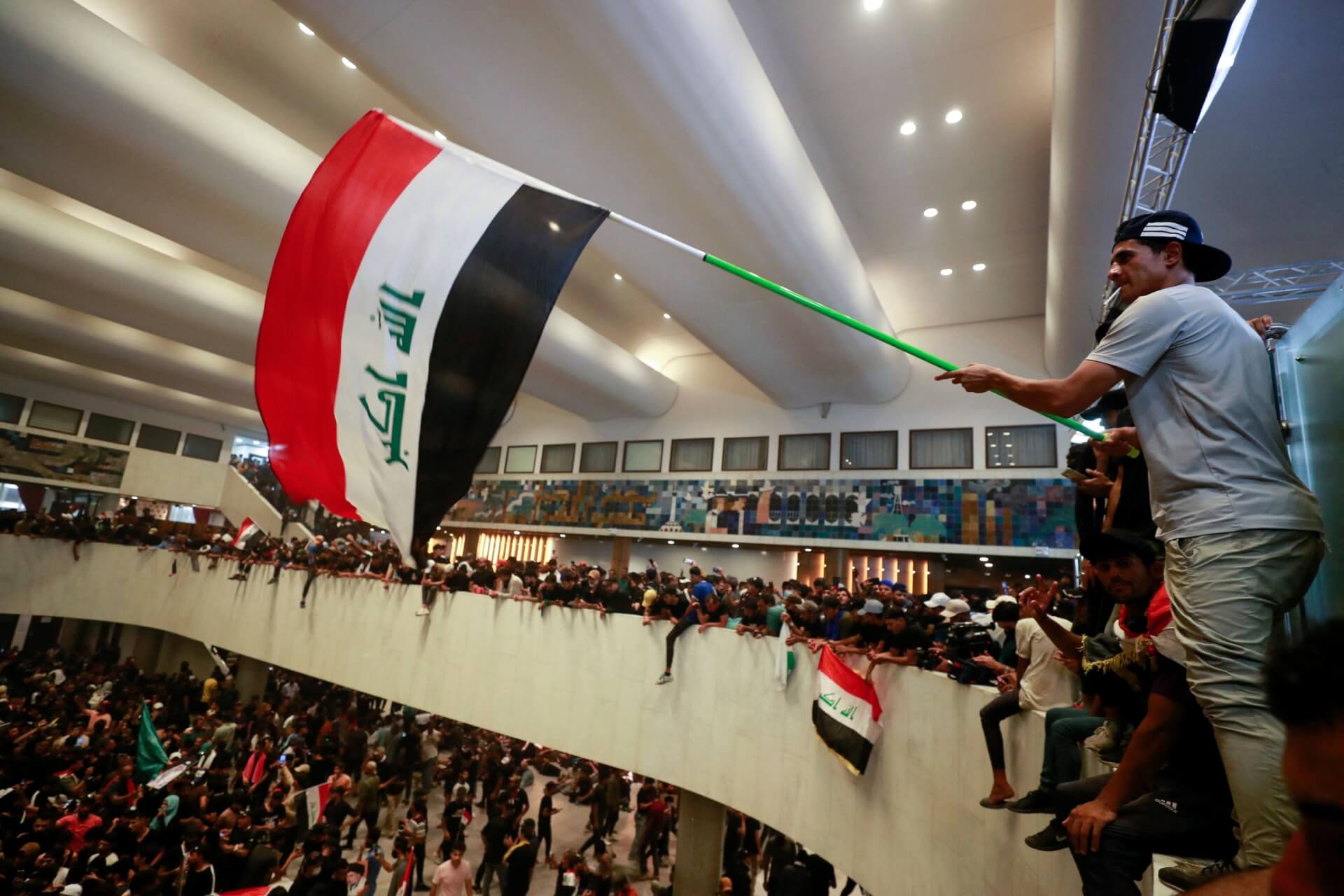The progress Iraq made following the Islamic State’s rampage between 2014 and 2019 appears to be waning, as thousands of supporters of firebrand Shia cleric Muqtada al-Sadr continue to occupy the parliament. The protesters, egged on by Sadr, have been occupying the parliament and other government offices in Baghdad’s Green Zone since August, demanding a new round of elections. The demonstrations followed the resignation of 73 members of the Sadrist bloc, which won the October 2021 elections, over the inability of parties to form a government more than six months after the results were announced.
The call for a new round of elections has been amplified by the fact that pro-Iranian parties currently have a higher chance of coming to power. The resignation of Sadrist members has allowed the Coordination Framework, an alliance of pro-Iran parties, to regain seats where it came second in the 2021 elections, enabling it to form government.
I argue that Iraqis are going to have to restore their own equilibrium. No one else can do it for them. Sadr’s effort to combine his religious and political ambitions, always contradictory, now appears to have reached an impasse. Iraq is paying the price. https://t.co/nMmy5cugC4
— Hussein Ibish (@Ibishblog) September 2, 2022
Sadr, who is a staunch opponent of foreign presence in Iraq, has said that one of the main aims of the protests is to prevent groups close to Iran from winning. He has previously warned against Iran’s growing influence in Iraqi politics and voiced concern over pro-Iran militias like the Popular Mobilization Forces (PMF), which is already acting as a parallel security force and has not integrated with the Iraqi military.
Sadr has also claimed that the protests are aimed at combating rampant corruption in Iraq. According to the 2021 Corruption Perceptions Index, Iraq is 23rd most corrupt country in the world and is ranked 157th out of 180 countries. The index blames the country’s power-sharing governance model as the main reason for pervasive corruption, stating that Iraq’s political institutions “demonstrate little public accountability.”
The picture of #Iran|ian leader Qasem Solimani being destroyed by the pro Sadr protesters in Baghdad today. #Iraq
— Zaina Erhaim (@ZainaErhaim) August 29, 2022
pic.twitter.com/Vfu1ywx0YL
In this respect, Sadr has been extremely critical of Iraq’s democratic model that was introduced with the help of the United States (US) following the ouster of former President Saddam Hussein in 2003. He has said that the democratic model based on sectarian quotas (Muhasassa), in which every religious group has reservations in the parliament, is the root cause of corruption and instability. In fact, many have attributed sectarian tensions between Sunni and Shia groups in Iraq to this political model.
However, despite flaws in its democratic process, Iraq has come a long way from Saddam’s authoritarian regime. The country has successfully held regular elections since 2005 and all its leaders have been democratically elected and appointed. Many have thus argued that the current protests by Sadr’s supporters threaten to end Iraq’s democratic progress and push it toward another round of lawlessness. Hussein Ibish, a Middle Eastern analyst, notes that the current crisis “is the most dangerous in many years,” as it has the potential of tearing down Iraq’s political house of cards.
In case you missed the news:
— 𝐌𝐢𝐜𝐡𝐚𝐞𝐥 𝐀𝐫𝐢𝐳𝐚𝐧𝐭𝐢 (@MArizanti) August 29, 2022
Intense clashes have broken out in the Green Zone between Saraya al-Salam (Al Sadr) and Iran backed PMF militias (security forces according to IRGC).#Iraq is on the brink of civil war.#Baghdad pic.twitter.com/lZC0zxxmBD
Sadr is not only obstructing the democratic process but also sowing the seeds of distrust among the public in Iraq’s fledgling democracy. Political scientist Marwin Alshamary argues that the crisis is the “closest that Iraq has come to civil war in recent years.” According to Alshamary, Sadr’s supporters believe that democracy has not worked. Moreover, even more people could join Sadr’s cause if the protests continue. This would most probably lead to a bloody conflict between the Sadrist bloc and the Coordination Framework, as both groups control loyal militias. The Sadrist protesters also oppose the appointment of a prime minister proposed by the Coordination Framework, something that increases the risk of conflict.
As a result, even several allies of Sadr have criticised him for instigating the protests. For instance, Ayatollah Kadhem al-Haeri, an influential Iraqi Shia cleric, denounced Sadr’s move as reckless and blamed him for creating sectarian strife. Haeri also called on Iraqi Shias to shift their loyalty from Sadr to Iranian Supreme Leader Ayatollah Ali Khamenei. Haeri’s remarks go against Sadr’s anti-Iran stance and could potentially boost the standing of pro-Iran parties and militias, something that could deepen Iraq’s political divide.
3) Likewise, the Framework parties sought to capitalise on Sadr's main mistake which was to withdraw his MPs and ignored his message. Sadr's threats of withdrawal from politics are always followed by a comeback. Here we come to the mistakes of the Framework parties.
— Lahib Higel لهيب هيجل (@LahibHigel) September 1, 2022
Moreover, while pro-Iran parties are mostly aligned and joined the Coordination Framework, other religious groupings appear divided. Kurdish and Sunni groups have for decades witnessed intra-party rivalries. The resignation of Sadrists only adds fuel to this problem, as many Kurdish and Sunni parties had shown an interest in allying with Sadr to form government. Therefore, the resignations further fragment the opposition to pro-Iran parties and give the Coordination Framework more power.
All of this suggests that the protests are not only leading Iraq towards instability but also eroding public trust in democracy. This lack of faith was witnessed during last year’s elections, which saw a record low voter turnout of 41%. The already low levels of trust in Iraq’s institutions could drop even lower if Sadr does nothing to put a lid on the protests.

